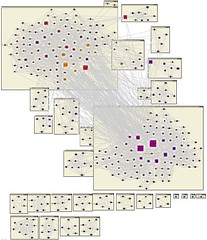February 21, 2008
Breaches of Confidentiality
 This week's CNE post was about Avandia leak affair. A reviewer leaked a damaging article about the drug to the manufacturer. Beside the bad form (and possible incompetence) it raises the problem of the actual, messy structure of how science is being done. If there were a neat distinction between independent scientists and corporate scientists (and institutions) competing interests would be easy to declare and monitor. But in reality the overlap, complex funding and non-monetary influences (from sponsorships to shared friends) makes the competing interests a continuum rather than binary.
This week's CNE post was about Avandia leak affair. A reviewer leaked a damaging article about the drug to the manufacturer. Beside the bad form (and possible incompetence) it raises the problem of the actual, messy structure of how science is being done. If there were a neat distinction between independent scientists and corporate scientists (and institutions) competing interests would be easy to declare and monitor. But in reality the overlap, complex funding and non-monetary influences (from sponsorships to shared friends) makes the competing interests a continuum rather than binary.
Is the fact that the first two months of my Ph.D. were paid for from the funding another research group received as part of a study from Cortex Pharmaceuticals enough to invalidate any ethical analysis I do about cognition enhancing drugs (they are researching ampakines) today, 10 years later? What about having a very nice lunch with someone who later joins a particular company or government agency? What about collegial ties as people move between pharma company and regulators?
In the end we have to judge papers and behavior on internal consistency, scientific quality and general ethical principles. We need to figure out ways of deciding that more efficiently so the inherent error-checking can overturn the creeping social biases.
And if the reviewer was right in his statement that he accidentally mailed the paper to the company, he needs some cognition enhancer. I wonder if ampakines might help?
Posted by Anders3 at February 21, 2008 06:04 PM